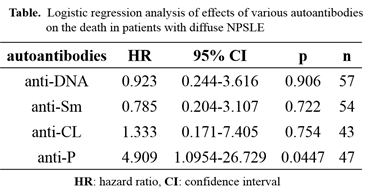Session Information
Session Type: Abstract Submissions (ACR)
Background/Purpose: Systemic lupus erythematous (SLE) is a chronic inflammatory disease characterized by the expression of a variety of autoantibodies. Although the comprehensive survival from the disease has been improved in recent decades, neuropsychiatric manifestations in SLE (NPSLE) still remain one of the difficult complication. However, the factors that influence the long-term mortality in patients with NPSLE, especially diffuse neuropsychiatric/neuropsychological syndromes (diffuse NPSLE), have not been fully elucidated. Anti-ribosomal P protein antibodies (anti-P) are detected in 12–16% of patients with SLE, and have been shown to be associated with diffuse NPSLE. The aim of this study is to clarify the effects of various autoantibodies, including anti-P, on the overall mortality in patients with diffuse NPSLE.
Methods: Fifty-eight patients with diffuse NPSLE (9 males and 49 females, ages 38.6 ± 17.0 years [mean ± SD]) who had been admitted to Kitasato University Hospital and to Teikyo University Hospital from 1992 to 2012 were exhaustively collected for the study. The medical charts were reviewed for various clinical parameters. The relationship of various serum autoantibodies with overall mortality was analyzed.
Results: Of 58 patients, 12 patients [20.7%] died during the observation periods (2322 ± 2250 days [mean ± SD]) including 6 patients from SLE itself, 5 patients from infections and 1 patient from aortic aneurysm. The 5-year, 10-year and 15-year mortality rates based on the Kaplan-Meier method were 17.9%, 22.0% and 30.7%, respectively. The overall mortality was neither correlated with age nor with the duration of SLE at the onset of diffuse NPSLE. Among various autoantibodies in the sera, the presence of anti-P, but not that of anti-DNA, anti-Sm or anti-cardiolipin (CL) antibodies, at the onset of diffuse NPSLE, significantly increased the hazard ratio for death of the patients (p=0.0447). Moreover, on the Kaplan-Meier analysis, the survival rate was lower in patients with positive anti-P than those with negative anti-P at the onset (p=0.0711).
Conclusion: These results indicate that the presence of anti-P in the sera is a significant risk factor for the poor prognosis of diffuse NPSLE.
Disclosure:
Y. Arinuma,
None;
H. Kikuchi,
None;
E. Ogawa,
None;
T. Wada,
None;
T. Nagai,
None;
S. Tanaka,
None;
S. Hirohata,
None.
« Back to 2013 ACR/ARHP Annual Meeting
ACR Meeting Abstracts - https://acrabstracts.org/abstract/anti-ribosomal-p-protein-antibodies-exacerbate-long-term-prognosis-in-patients-with-diffuse-neuropsychiatricneuropsychological-syndromes-in-systemic-lupus-erythematous/


